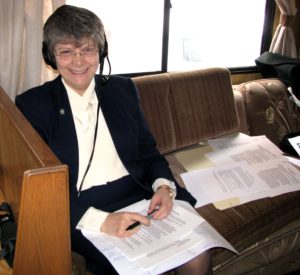She lived with a handful of Ursuline Sisters, but in her third year in Whitesville, the Sisters of Charity merged their convent with the Ursulines, and the new librarian was a Benedictine Sister. “It was a great experience to learn about different communities, we learned each other’s important days,” she said.
While living in Whitesville, Sister Cheryl continued her social justice efforts. “I got involved in an ecumenical peace group in Owensboro. We held forums, ran letter-writing campaigns, spoke at parishes. There was a lot of education on nuclear fallout.”
In 1983, after three years in Whitesville, she asked community leaders if there were any full-time justice ministries open. Within a month she was asked to apply for the position in the Office of Social Concerns, which was started by new Owensboro Bishop John McRaith.
That year she began as co-director of Social Concerns, along with Ursuline Sister Kathleen Kaelin, and became a part-time instructor at Brescia. “I don’t think I would have seen myself as a college teacher without the adult education experience,” Sister Cheryl said.

Sister Cheryl awaits the beginning of the ordination of William Medley as bishop of the Diocese of Owensboro on Feb. 10, 2010. Sister Cheryl used her expertise to narrate the ordination for those watching on TV, the Internet, and the DVD completed after the ordination.
She finished her master’s in 1984, and taught Old Testament, New Testament and Catholic doctrine at Brescia, and also helped set up the ministry formation program. “I did research at other schools on their ministry formation programs. Sister Michele (Morek) helped me a lot,” she said.
In the Social Concerns office for the diocese, “We started a Peace Commission, Rural Life Commission, and Black Catholic Commission,” she said. “The first year, the bishops were working on their first letter concerning the death penalty, I was the staff person for that, doing the research and preparing the draft document.”
She did evening reflections for police officers, health care workers, and social workers, and offered education on unions. “Our emphasis was on education, not demonstrations,” she said. “We did one demonstration at Eddyville when they restarted the death penalty.”
In 1985, she left Brescia and became the full-time director of the Office of Social Concerns. “I met some extraordinary people,” she said. “The Black Catholic Commission had the priest from Chicago who adopted kids, Father George Clements,” whose story was made into a made-for-TV movie in 1987.
Sister Cheryl was able to hear multiple sides of issues in her role. During a discussion on the morality of using the atomic bomb on Nagasaki and Hiroshima, Japan, a man said he had trouble faulting that decision, because without it, he would have been involved in the invasion of Japan, which would have cost countless lives.
“I learned there are legitimate opinions on both sides of an issue,” she said.
McRaith, now bishop-emeritus, said Sister Cheryl’s knowledge, hunger for more knowledge, and her heart for social justice were keys to her success in the Office of Social Concerns. The two have remained friends through the years, sharing concerns of the Church and ministry.
“She just remembers everything she reads, hears, and sees and can relate it back to you,” McRaith said with a laugh.
Sister Cheryl has high praise for the role McRaith has played in her life. “Together with my community and my family, his support, acceptance, and friendship have been what made the successes in my life better and the difficulties easier,” she said.
Back to school
In January 1988, Sister Cheryl left the diocesan ministry to begin working on her doctorate. “I had known I wanted to do a doctorate before I finished my master’s – I love to study,” she said. “I was destined for Brescia.”
In choosing the school for her doctorate, she wanted a Catholic university that offered a quality degree, and one she could drive to within a day. That’s how she ended up at the Catholic University of America in Washington, D.C., to pursue her degree in historical theology-systematics, which deals with the doctrine of the Church.
“I’m a context person. I wanted to find out how we got here,” Sister Cheryl said.
In her first semester, she took Latin. She had a class with the famed Jesuit priest and educator Avery Dulles, who was retiring that year. Some of the questions on his tests were in untranslated Latin, Sister Cheryl said. “He just expected you to know Latin,” she said.